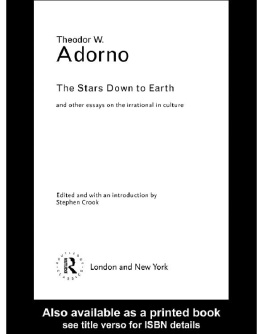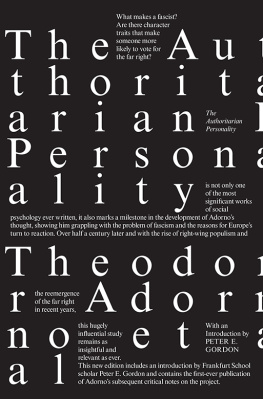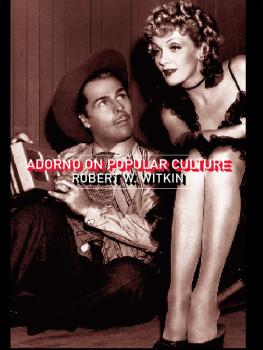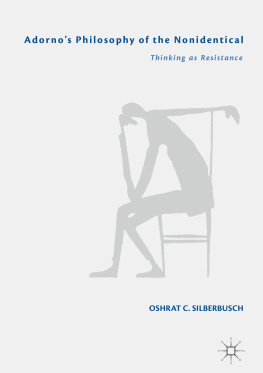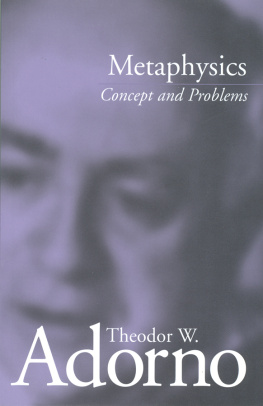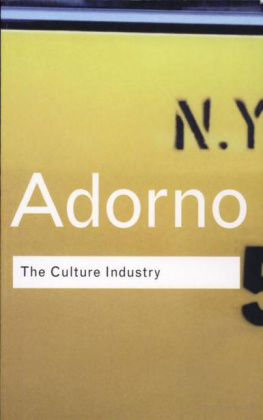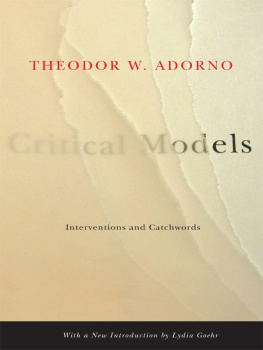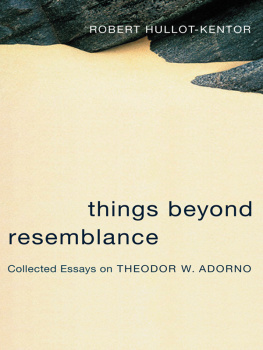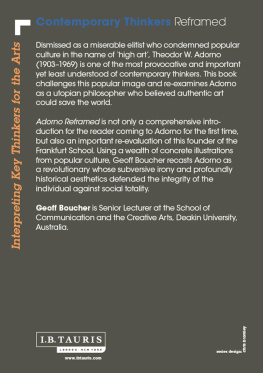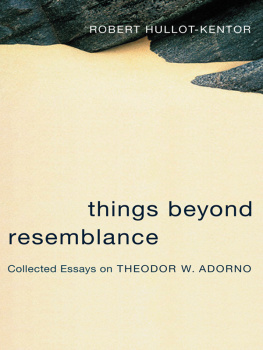The Stars Down to Earth
Theodor Adorno returns from the grave to deliver this timely warning about the dangers of superstition.
The Modern Review
This collection demonstrates the continuing relevance of Adornos work to the analysis and understanding of modern times. A brilliant contribution to the sociology of racism, anti-Semitism and popular culture.
Bryan S. Turner, co-editor, The Penguin Dictionary of Sociology
Theodor W. Adorno
The Stars Down to Earth
and other essays on the irrational in culture
Edited and with an introduction by
Stephen Crook

London and New York
DEPENDENCE AND CONFORMITY: LINKING FASCISM AND THE CULTURE INDUSTRY
For Adorno the prejudice, aggression and conformism of fascism could not be dismissed as a heteronomous intrusion into the otherwise civilized order of modern society. On the contrary, fascism is at home in capitalist modernity. If it is a form of irrationalism its roots are none the less also those of what now passes for reason. It was because he saw fascism as a possibility built into the very fabric of modern capitalism that Adorno was muted in his celebration of the defeat of its Italian and German manifestations. To state the case crudely, Adorno saw the commodified American culture of mass-consumption, movies, jazz and radio serials as putting into play the same basic psychodynamic principles that formed the basis of fascism: psychological dependency and social conformism. The homologies between fascism and the culture industry can be explored in a discussion of three themes which are common to The Stars Down to Earth and Anti-Semitism and Fascist Propaganda. They can be labeled the rhetoric of dependency, seriousness and unseriousness and rationality and irrationality.
The rhetoric of dependency
When Adorno made a study of radio broadcasts by the anti-Semitic preacher Martin Luther Thomas and compared them to other similar materials he was struck by the amazing stereotypy of all the fascist propaganda material known to us, observing that the cliches or devices employed by fascist agitators could be boiled down to no more than thirty formulas. The rather loose structure of the Thomas study consists of discussions of thirty-four such devices assembled in four larger groups. The first group of devices concerns the self-characterization of the agitator. For example:
Lone Wolf: I have no sponsors, and no politicians ever put one dollar into this movement.
Persecuted Innocence: they write everything against me, they write that they are going to kill me.
Indefatigability: I am asking you only to sacrifice with me. I dont ask you to work as hard as I work.
In the second group of devices Adorno identifies what he takes to be the kernel of Thomass method, in the third he examines the specifically religious dimension of Thomass propaganda and in the fourth he lists the political topics which Thomas most frequently uses as ideological bait. For Adorno, the stereotypy of these devices is itself a psychologically well-judged ploy which he sees reflected in the wider culture industry and the
Beyond this, Adorno documents the way in which each device sets off a series of psychological resonances which will further bind the vulnerable listener to Thomass movement. Many of these resonances have already been discussed in general terms. The listen to your leader device veils the emptiness of the Fhrer principle in a fetish akin to the principle of all advertising slogans. The tingling backbone device alludes to the atrocities committed by the enemy to mobilize the sado-masochistic ambivalence of authoritarianism. The great little man device portrays the leader as the mixture of pettiness and grandeur That feeling arises mysteriously and irrationally from the acknowledgement of weakness and identification with the victor.
As an afterthought, Adorno adds by the way that the same mechanism is activated throughout modern mass culture, particularly in the cinema. The promotion and manipulation of fatalism is a central theme of Stars. Caroll Righters Astrological Forecasts column
indulges in a symbolic expression and psychological fortification of the pressure that is being continuously exercised upon people. They are simply to have faith in that which is anyway they are trained to identify themselves with the existent in abstracto rather than with heroic persons, to concede their own impotence, and are thereby allowed as a compensation to go on living without too much worrying.
The trade-off to which Adorno alludes here is the formula for a quiet life of dependency and conformism that is as appropriate to getting by in the consumerist United States as in Nazi Germany.
Adorno arrives at the most basic rhetorical principle of Righters column by nothing a powerful obstacle to its aim, which he takes to be promoting conventional, conformist and contented attitudes.
In this bi-phasic approach, A.M. is for work, reality and the ego principle. P.M. is apparently for the instinctual urges of the pleasure principle. This neurotic pattern structures many of the rhetorical devices of the astrology column and of fascist propaganda: weakness and strength, masochism and sadism, conformity and rebellion, social forces and individuality, conservatism and modernism. The reader or listener is offered not a resolution of contradiction but its quasi-neurotic enactment in a regulated oscillation between the two poles, an oscillation in which the pole of weakness, masochism, conformity and abstract social force is dominant.
Two rhetorical consequences flow from this bi-phasic structure. First, and most obviously in the case of fascist agitators such as Thomas, it is a mistake to look for arguments in such material: in objective terms, Thomass radio speeches are quite illogical. an embodiment of the demands of society in the different spheres of life. He cites many examples of the tenor of Righters view of relationships.
Influential friend gives good pointer for securing wish, goal Executive or responsible higher-up, if contacted by you will show right way to increase and expand present outlets A powerful man readily gives you a bright new course of action if you evidence interest.
In each case, the trick is to present psychological dependency and social conformity as a cleverly-judged individual strategy of self-advancement that at the same time does away with the need for any real choice. An attempt is made to transform narcissistic losses into the gain of getting rid of the burden of autonomous responsibility and, possibly, adding some masochistic gratifications.
As usual, Adorno insists on the ubiquity of this mechanism within modern culture: conformity is the socially sanctioned form of self-expression. If Righters column (and by implication the wider culture) differ from straightforward propaganda it is because the column is subject to a kind of censorship. For example, Adorno asks why so much is made of the friends while little or nothing is made of the foes, giving only half of an incipiently paranoid bi-phasic opposition. Earlier he notes that references to threats to the reader are almost always couched in a euphemism:
one of the most widely spread realistic threats, that of being fired, appears only in a diluted form, e.g. as conflicts with higher-ups, being dressed down, and similar unpleasantnesses. The term firing is not used a single time.
While Adorno does not discuss the issue explicitly, the under The exoteric radio speeches are to be understood as advertising (and fund-raising) for the more virulent esoteric movement. The source of Adornos pessimism about the threat of fascism is his conviction that the rantings of a Thomas or a Hitler play on the same regressed character structure as do soap operas and astrology columns. The rhetoric of fascist propaganda is simply a less censored version of the ubiquitous rhetoric of the culture industry.
Next page
